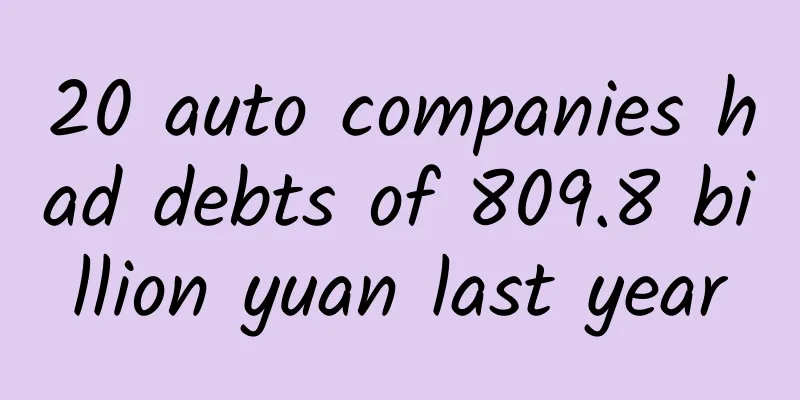Given a scenario, can Alipay recreate an Alibaba?

|
In the past few days, we have witnessed a miracle. On the eve of the Chinese New Year, thousands of hardworking and brave Chinese people were facing the TV and mobile phone screens, swishing... their hands were numb, their legs were broken, their waists were sore, and their backs were bent. Many of them had never known what "dedication" was before, but they shouted: "I want to be dedicated, I want to be dedicated, where is dedication, I have a good idea, I just need one dedication, give me one dedication and I will lift half the earth!" Is this the largest monkey show in the history of the Year of the Monkey? No, this is people using Alipay... Since the campaign of collecting the five blessings and grabbing red envelopes began, the Internet has been filled with both praise and abuse, and the soft articles are all in a black tone. However, if you think about it carefully, many people who criticize Alipay compare it with WeChat, saying that "Ali is not good at social networking." However, when the new version of Alipay copied WeChat pixel by pixel in July 2015, they said: "I am not doing social networking, I am doing relationship chain applications in financial scenarios." The "Five Blessings" campaign has indeed subtly attracted people to this financial scenario (exchanging for blessing cards). On the one hand, it has achieved the goal of fundamentals, and on the other hand, it has effectively blocked the strategic expansion of opponents. However, there are also articles praising that this is Ali's Normandy landing after Tencent's "Pearl Harbor attack" two years ago, but the author can't help but ask-when the event ended, all the noisy Alipay groups were silent overnight, and the whole world was quiet. Is this considered a "Dunkirk evacuation"? It is hard to say whether Jingyefu is a merit or a fault, but some problems are obvious. 1. The crux of the Alipay problem In fact, whether Alipay is social or not is not a big issue. The most important thing is that there is no scenario for people to use Alipay for IM. Without a scenario, there is no demand, let alone cultivating user stickiness and habits. So when Alipay launched the new version, it said it would cut into the "financial scenario relationship chain", but it did not give a satisfactory answer to what this financial scenario is. The author has not carefully read the popular "Scenario Revolution" some time ago. According to a superficial understanding, the so-called scenario is "use when you want to...", which is a psychological connection similar to "positioning": if you want to find cheap food, go to Meituan; if you want to book a cheap flight, go to Qunar; after taking a selfie, quickly open Meitu to smooth the skin... And this kind of scenario should also be high-frequency and appear frequently in life, because people are too lazy to choose and balance. In the end, the number of apps that can be left on their phones and opened every day is extremely limited. They are rarely willing to download an app specifically for a low-frequency non-rigid need, especially when this demand can be met by other high-frequency applications - for example, when the high-frequency WeChat can also pay the phone bill, I am too lazy to open Alipay to pay, let alone log on to the operator's website to pay. From this perspective, the demand for Alipay is relatively rigid and has a certain frequency. The only drawback is that the single use time is too short. Because it is just to open the electronic wallet to pay money, at most you can appreciate the various savings data in the wallet. At present, the "mobile payment habit" is gradually replacing cash and card consumption and is becoming more and more popular. Alipay is almost the "incarnation of mobile payment" in people's minds, and they can sit back and relax. But at this time, a cross-border competitor appeared. In the long run, as the high-frequency and high-stickiness WeChat platform continues to expand payment scenarios, Alipay will inevitably be impacted in the field of small payments such as "change, red envelopes, water, electricity, gas, etc." In order to maintain its position in daily small consumption, Alipay must establish a richer and more high-frequency scenario position, so that people will naturally think of Alipay more often in their lives, rather than only thinking of it when paying as it does now. Payment has never been the starting point of a transaction but only the end point. Everything is just as Jack Ma said at the Wuzhen Internet Conference: "This is an era that destroys you but has nothing to do with you; this is an era that crosses borders to rob you but you are powerless to fight back; this is an era where you wake up too slowly and don't even need to wake up; this is an era where it's not that your opponent is stronger than you, but that you don't even know who your opponent is." Whether it is offense or defense, or whether it is offense as defense or defense as offense, if Alipay wants to win this scenario war, it must pass four life and death levels: First, the large-scale precipitation of relationship chains Alipay already has more than 400 million users, but like all tool applications, people only use it as a tool. One prominent manifestation is that you can only see the connection between people and functions on the platform, but you can't see the connection between people. This is the so-called relationship chain is not settled. If the relationship chain is not settled, all financial scenarios around human interaction are out of the question. So this time, through Zhikouling and changing Fuka, Alipay obtained 1.1 billion pairs of relationship chains at one time, which looks good on the one hand. But on the other hand, due to the massive spread of Zhikouling and people's efforts to grab Fuka, the quality of the relationship chains obtained has become unprecedentedly "uneven". Originally, when Alipay 6.0 was launched, the friends I added were really people I knew. But now I don't know who many of my friends are and don't want to know. Second, large-scale improvement of product iteration capabilities After years of fierce competition, as the big brother of the Internet industry, Alibaba's operational tactics have long been perfected. It is almost unrivaled in "promoting user consumption, promoting business cooperation, and guiding user behavior in the short term", and its sales team with high execution ability is also a legend. The only shortcoming is in the products related to the macro strategy, which gives people the feeling that it is more dependent on Jack Ma's strong strategic vision. In the field of mobile Internet products, which Jack Ma is not familiar with (no one is perfect), it is a bit lost. A more obvious example is that when the Alipay app is opened, the first screen has 37 function buttons that are not logically prioritized, pushing the difficulty of choice to the user right from the start, which is unimaginable in ordinary Internet companies. However, this also reflects the dilemma of large companies themselves, with so many people, so many departments, and so many business lines, any emphasis on one or abandoning another may cause a storm internally, so it is better to simply take the middle way and make everyone the same. Alibaba's product capability issues are more due to its past experience, that is, it is a platform rather than a product, it runs a shopping mall (Taobao, Tmall), what it needs to do is to grasp the pain points of each merchant, provide them with venues, advertising, payment infrastructure, and make "no business difficult" through strong profit sharing and promotion, but it is not a "specific commodity on the shelf", so how to grasp the needs of C-end users and cultivate their loyalty and psychological belonging is not its strength. However, in the future war, Alipay will almost have to establish a strong product innovation system, so that people who can see the gunfire on the front line can come up with ideas, ideas based on the depth of human nature rather than simple data statistics, and ideas based on the company's future competition rather than KPI assessment. The third is to seize the user's mental space Undoubtedly, Alipay has seized the psychological positioning of "mobile payment" in people, but this positioning in turn limits the expansion of scenarios. Because in everyone's eyes, Alipay is like "wallet + POS machine". Using "wallet + POS machine" to chat and communicate with people is not only inconsistent, but the most terrible thing is "unsafe". Why are people willing to chat when the "Five Blessings" campaign comes? Because it is stimulated by the interests of 200 million yuan. In the face of huge interests, safety issues can be put aside first. However, such stimulation is not normal, so how to reverse the impression in people's minds and establish a new positioning of "non-destructive and safe, using money between people" is particularly important. Fourth, establish a new scenario that is down-to-earth and reliable The solutions to the above three points ultimately point to the establishment of scenarios. Once the scenarios are established and people's habits are formed, the moat against WeChat Pay can be formed. Therefore, "financial scenario relationship chain application" is a very high-sounding statement. If you really want to put it into practice, you have to make it down-to-earth and tell everyone clearly: "When is the best time to use Alipay!" Send red envelopes? AA payment? Join a group to pay? ... Facts have proved that these scenarios can be achieved with high-frequency Tencent products. Why bother to open an Alipay specifically? As for the collection and exchange of lucky cards, this is a new scenario created by Alipay from 0 to 1, but this scenario is too far away from people's living habits and too low in frequency. If you have the ability, you can send 200 million Alipay cards every week. Using petty profits to buy people's hearts will only win the hearts of those who are speculative and greedy for bargains. Once most people can't even get this bargain, all they will win is a lot of abuse. Alibaba's operations are good at "being clever", but if being clever is not based on grasping the actual needs and psychological details of users, it will only become "being too clever". Don't think that victory is achieved by how many people download, add friends, and use IM and SNS circles. Please look at why they come, and why they will leave.
2. The pattern of scene war Regardless of whether Alipay is social or not, the scenarios it wants to enter should meet these three characteristics: 1. Financial attributes, related to money and credit; 2. Involving relationship chains, in communication between people; 3. High frequency, preferably local. So, let's take a look at the current situation of the scenario war. The common communication scenarios of people in daily life are nothing more than: 1. Communicate with acquaintances, such as chatting with relatives, friends, and lovers, anytime, anywhere, without the need for a reason. 2. Communication at work or in study is based on the user’s identity (company employee, student) and is highly targeted and beneficial. 3. Communication in business transactions. 4. Communication among interested groups usually revolves around specific events and topics. 5. Hooking up with strangers. 6. The characteristic of a chance encounter and confession with a complete stranger is that one can often take off the mask and say something from the heart. From the perspective of urgency of demand, 1 and 2 are the most urgent and indispensable. 5 will generate huge demand at a certain stage, but will gradually weaken after that. From the perspective of frequency of occurrence, 1 and 2 have the highest and most stable frequency. 5 will become high frequency in the short term but unstable in the long run. The reason why WeChat is so powerful is that it has basically taken over most of 1 and 2. Most of the needs of 4 can be met by WeChat groups. At the same time, WeChat has also taken over a small part of 3, 5, and 6. The stable traffic brought by these blocks is far from comparable to 1 and 2, and the commercial value is greatly reduced. Moreover, if the relationships in 3, 5, and 6 want to be transformed into 1 and 2 (in the future, they will be acquaintances or people with stable contacts), then the relationships will also be transferred to WeChat. This is a disastrous scenario monopoly capability, and the first to suffer are those vertical social applications. The advantage of vertical social applications is that they can more accurately obtain the traffic of vertical groups through "higher vertical content and relationship acquisition efficiency than WeChat", and make money through precise advertising and e-commerce. However, the gradually powerful existence of groups has caused a large number of relationships discovered and acquired on vertical platforms to eventually be transferred to penguin interest groups (WeChat or QQ). Vertical social networking only discovers relationships but does not settle them, and eventually becomes Tencent's wedding dress; at the same time, the increasingly powerful public accounts and interest engine reading applications (Toutiao, Yidian Zixun, Dudu Daily) are also rapidly eroding their content space. We have less and less need to download a vertical APP specifically for the content of a certain vertical field. In the end, only the truly closed vertical fields that are "not suitable for conversion to WeChat", such as homosexuality, can barely survive. Good scenarios are becoming increasingly difficult to identify. For example, in the early days of mobile Internet, you could succeed by just thinking about an idea without having to think too much. This is no longer conceivable today when the dividends have been exhausted and there are many strong competitors. What about Alipay? There is almost no possibility of taking 1 and 2 in the short term, especially after copying WeChat exactly. Since it is exactly the same as WeChat, why should I use you instead of WeChat? It is like, we have always laughed at Dong Shi imitating Xi Shi, but today Dong Shi came back from Korea, and her face is the same as Xi Shi. But if Xi Shi, a natural beauty, is already in my arms, and my friends all know the relationship between me and Xi Shi, why should I let her go, for that 271.66? You should give me a Yang Yuhuan (different aesthetics and freshness), and I might consider it. Or give me an ugly but practical Queen Ma (functional complementarity and differentiation). The biggest difference between Internet products and traditional businesses is that "copycat tactics" here not only cannot make a penny, but often become the biggest publicity for opponents. If they cannot get 1 and 2, then for scenarios like AA payment and sending red envelopes, Alipay is using the low-frequency action of payment, while Tencent is using the high-frequency action of daily communication and chatting. There is no suspense as to who can lead the way better. So today we see various reports saying that DingTalk is seizing workplace social networking, Momo is seizing stranger social networking, Weibo is seizing new media, and with Alipay, it seems that WeChat is being cannibalized by Alibaba from different angles. But in fact, DingTalk has indeed achieved good results, but Momo has long been in a dilemma of user structure collapse and product ecology deterioration due to early positioning errors, and Sina Weibo has fallen into excessive centralization and fragmentation, and the vast majority of users are silent. Basically, they cannot form an effective counterattack. The actual scenario disadvantages faced by Alibaba are greater than imagined. So where is the breakthrough? It seems that it can only be 3 and 5. 6 has no commercial value, and as for 4 - for Alibaba, which does not have the ability to operate deep content and build a social ecosystem, it does not need to consider it for the time being. Then we will talk about: the possibility of Alipay doing stranger social networking and the future of establishing a new form of transaction order. 3. The possibility of Alipay doing stranger social networking In the past six months, many stranger social networking platforms that were once thriving have all collapsed. The core problem is that "real information cannot be accumulated, matching efficiency is too low, and stable relationships cannot be retained." In other words, stranger social networking must first have a stable and high-quality male and female user base, and secondly, solve the problems of integrity, security, and intelligent matching. Without these two breakthroughs, there is no way to talk about "effective in-depth social interaction", "reconstruction of community relationships", "precipitation of personal information and group belonging", etc. However, Alipay does have the advantage of solving this problem. That is, by linking various application functions of the Alibaba system, it has mastered a large amount of user consumption, finance, and credit data. If used skillfully, it can establish a "safe, honest, and privacy-conscious" stranger social environment, making it impossible for losers who try to "cheat" to hide. Here, having everyone's "credit database" is a card of Alibaba. Specific methods can be: First, a flexible security and privacy strategy. Alipay can adopt a strategy of anonymity in the foreground and real name in the background. The accumulation of real data is a norm and constraint on user behavior, and the anonymity in the foreground also guarantees the privacy of users. Users can publish part of the real data according to their own wishes, so as to complete the outline and endorsement of their social image. For example, how much credit points are there, what expensive things have been bought on Tmall, and how much was the total consumption on Taobao last year. This allows social interaction to be carried out in an atmosphere of "protecting privacy and being relatively reliable" - you say you have money, but your personal page is empty. Second, a rich credit system. Sesame Credit is divided into two dimensions, "financial credit" and "social credit", and presented together. The former corresponds to the current Sesame Credit, and the latter corresponds to the user's social behavior, whether there is excessive advertising, and whether it is frequently reported? Such a two-dimensional presentation can effectively curb the fraud in social behavior and control the information overload caused by micro-businesses, water armies, and jokes. The third is to establish payment barriers. Pay attention to all places where the wallet zipper may be "unzipped a little bit". In order to avoid giving people the insecurity of "communicating with people with a wallet", you have to add more locks to the wallet: you can classify friends, so that low-level friends cannot use the "money function" during communication, or if they use it, there will be a warning and limit on the amount; you can switch the status, so that the "money function" cannot be used in the general chat state; you can strengthen payment confirmation, and remind people to confirm twice when using money; you can establish a mechanism similar to Alipay shopping, and the payment can be revoked within a certain time and conditions; you must establish a strict and clear transaction record system, and never lose the chat records and transaction records after reinstalling; you can limit the transaction objects, such as users who are not fully authenticated, have low Sesame Credit scores, and do not display certain key information are not allowed to use the money payment function. Fourth, create a "date" story around the offline ecosystem. The second word-of-mouth merchant in the bottom bar of Alipay can become a scene for offline dating; Taobao movies, Didi Chuxing, air tickets and train tickets, Ali Travel, etc. in the first screen can all be integrated to provide a one-stop service for "dating". The existence of social credit data provides a certain guarantee for the screening of dating partners and the safety of the dating process. So what is the most important thing now? How to make them work together around the user's "invitation"? Even as long as the user forms an invitation and puts forward a demand, the system will automatically recommend the most favorable one-click plan for them (one-time prepayment, all meals, movies, travel and accommodation are solved, and automatic reminders are given during the process), thus becoming the user's dating consultant (saving money, automatic, and safe). Many social O2Os are jealous of this, but unfortunately they can't do it at all. Alibaba has such a foundation, it depends on whether it dares to do it. Based on credit data, with payment security and privacy protection as the premise, integrating rich consumption scenarios to establish personalized and intelligent dating plans and services...The above is purely wishful thinking. 4. The establishment of a new trading order may be the future Compared with stranger social interaction, the establishment of a new form of transaction order will be more attractive to Alipay. After all, Taobao's success is largely due to the use of extremely powerful solutions such as Alipay to frame the e-commerce transaction order in the PC era, thus solving many pain points in the past e-commerce such as lack of credit, low product quality, difficulty for small and micro businesses to survive, and difficulty in communication between buyers and sellers, bringing about a new era. Now, people's transaction and consumption patterns are facing new changes, and "making business easy" has new connotations, requirements and difficulties, which gives Alipay a new opportunity to make great achievements in the scene war. In the previous article, the author has simply divided the scenarios of people's daily communication. So, from another perspective, let's take a look at people's common daily communication behaviors:
From two perspectives, the communication in transaction scenarios is more in line with Alibaba’s genes. Compared with AA payment, acquaintance lending, gift red envelopes, etc., such “financial relationship chain communication scenarios” seem to be more stable and rich. So now the core is to make it more frequent and make communication around transactions a normal state, even when no transaction occurs. This is the arrival of the new form of transaction era. So what is the new form of transaction? Is it O2O? Is it the sharing economy? In my opinion, these are all organic components of the new form of trading. The so-called new form of trading must be an explosive leap forward in four issues: First, who will sell? At first, it was merchants with business qualifications, and later it was more flexible entities such as Taobao sellers. In the future, in the new economic era, everyone can be a trading entity and everyone can do business. Second, what are we selling? From traditional material entities to today’s spiritual consumption, from traditional commodities to today’s services, knowledge, skills and even time. Third, when to sell? The richness of trading entities and types of transactions will effectively cultivate people's trading habits. In the future, people will pay at more times and in more scenarios and for more reasons. Fourth, how to sell? From traditional one-way advertising promotion to today's social community content dissemination, there will be more intelligent and accurate matching in the future. Uber and Airbnb are very good examples. Everyone can be a car owner or a house owner, and the use rights of idle cars and rooms can be sold. People have more choices in travel and business trips, and are more willing to make such consumption choices. All of this is intelligent matching and can form credit data. Today, the emergence of spaces and hall guests in the field of knowledge and skills will enable people to make money in more ways. It is not impossible for 50% of people in the United States to become freelancers through knowledge and skills. The emergence of a new form of economy is always based on three premises:
Based on this, we can imagine that the new form of transactions may have the following characteristics:
This kind of transaction may only be possible with Alipay. We have seen that many players in the knowledge and skills trading business are not very popular, because this kind of transaction is not frequent in China today, and trust is a big problem on small platforms. Some platforms for running errands are simply not working, either the commission is too low to be worth people's time, or the tasks are too non-standard so that buyers and sellers do not trust each other and there are constant frictions. For example, the ERA platform that made a big splash last year was once an Uber that wanted to be a personal task trading platform. It is difficult enough to get people to deposit all kinds of real identity information and to constrain personal behavior by establishing a credit database. But when the product was launched, it also told a story about dating. Many people go there to hook up, but how many of them are willing to deposit their real data? However, Alipay has inherent advantages in solving this problem. The number of users (especially high-quality users) is large enough, and the credit and real data of users are inherently accumulated. It also has the powerful data resources accumulated by the Alibaba system over a long period of time as a foundation. Next, as long as it conducts pilot projects in specific sub-categories and then gradually expands, it may really become the creator of a new era of transactions, thereby recreating an Alibaba. Let us imagine that one day everyone’s personal homepage on Alipay may have a private store, and when it is opened, one can see the idle resources, knowledge and skills services it can provide, etc.; when we need a certain service, the powerful search can immediately help us find nearby individuals who can meet the needs and recommend the most suitable options; for non-standard service types, the system will give guiding pricing suggestions, and there will also be transaction credit points for each service provider, which helps us make the best choice; we often communicate on Alipay because we are both buyers and sellers, and more importantly, valuable individuals. In this way, Alipay's scenario problem can be effectively solved, because it is not only a payment platform, but also a transaction platform for everyone. "Continuous communication scenarios based on transactions" has become a new moat. We still chat on WeChat, but at the same time do business on Alipay. In fact, Alipay does not need to complete this transition in one go. It only needs to find a few mature categories with the highest frequency and lower risks, and then gradually cultivate user habits and encroach on them. The scene war has just begun, and what will happen next is still unknown, but it has also whetted the appetite of people in the industry. The competition between giants will provide first-hand business war teaching cases. Of course, everything mentioned in this article is just a temporary guess, and it is inevitable that there is a lot of nonsense and absurdity. But there are some things that even if the giants don’t do, we entrepreneurs will not let go in the future. The giant has its destiny - it can make it rise from the ground, or it can eventually send it to the grave. For this era, the new generation has the mission of the new generation. As a winner of Toutiao's Qingyun Plan and Baijiahao's Bai+ Plan, the 2019 Baidu Digital Author of the Year, the Baijiahao's Most Popular Author in the Technology Field, the 2019 Sogou Technology and Culture Author, and the 2021 Baijiahao Quarterly Influential Creator, he has won many awards, including the 2013 Sohu Best Industry Media Person, the 2015 China New Media Entrepreneurship Competition Beijing Third Place, the 2015 Guangmang Experience Award, the 2015 China New Media Entrepreneurship Competition Finals Third Place, and the 2018 Baidu Dynamic Annual Powerful Celebrity. |
<<: Do you still remember the year 2006 when people sent New Year greetings via text messages?
>>: Zuckerberg was elected the best CEO in the US technology industry
Recommend
What is it like to have a "SPA" in a cabin at -180℃?
Amid the anticipation of the people across the co...
5 common methods to improve user retention!
In the current context where it is difficult and ...
3D facial recognition is collectively abandoned by Android manufacturers, will under-screen fingerprint take over?
The 3D face recognition technology that was popul...
Aren't plants afraid of fire? How did they learn to "add fuel to the fire" and "take advantage of the fire"?
In our impression, fires seem to mean a catastrop...
Which smart mini-program resources need to be deleted? How to delete the content of smart mini-programs?
When there are dead links, low-quality resources,...
Offline payment war among giants: WeChat's offensive is fierce, while Alipay survives in adversity
Under the fierce attack of WeChat for two consecu...
With the slowdown in functional innovation, what else can domestic mobile phone ROMs compete for?
[[148867]] Since Google services have never been ...
3 skills for short video script conversion
Many of your scripts are good content in the trad...
Restoring factory settings is not free from porn scandals
Security software developer Avast this week questi...
City Commercial Bank Credit Card Marketing Methods
I have recently been reading the "definition...
Huawei Developer Competition offline sharing session @ Huawei Connect Conference
On August 31, 2016, HUAWEI CONNECT 2016 was grand...
Which is the best server rental company with high bandwidth? Large bandwidth rental brand?
5G has arrived quietly. 5G represents low latency...
In terms of supporting the common growth of the supply chain, we expect Chinese automakers to give excellent answers.
While you are hurrying along with your head down,...
How to create a hit product?
A good product can increase the probability of be...
Five things you need to know about TEE
The Android phones we usually refer to are not on...









